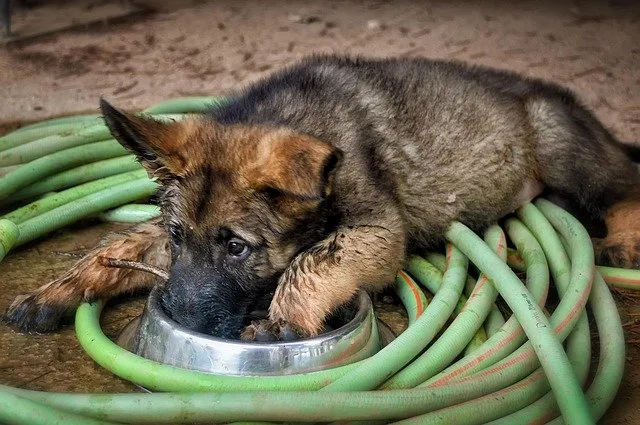If you are considering getting a German shepherd puppy or have just brought one home, you probably have many questions.
Many of these questions may have you wondering exactly how big your German shepherd puppy will be when fully grown and how fast they will grow.
Will your pup be larger than others? What is the normal or average height or weight of a German shepherd?
Although there are answers to these questions, how big your German shepherd puppy will be when fully grown will involve many factors.
In the following reading, I will lead you through the German shepherd puppies’ growth stages.

For your dog’s vitamin supplement, food, toys, or other dogs product please visit the Sundays for dogs website.
Birth to Three Weeks
Unless you have participated in the breeding process, you will probably not be part of the first two stages of your German shepherd puppy’s life.
The one most important piece of information when considering adding a German shepherd puppy to your family is to seek out a reputable breeder.
Ask a veterinarian or friend or someone you know who has gotten this breed and also has been happy with the outcome.
Get some good references. This is the most important part of getting a shepherd that has healthy parents with good genetic lines to ensure your pup has no health problems or behavioral issues, due to bad genes.
A breeder that is known to have a good reputation is imperative in this endeavor. When you find one, always ask to see the kennel, parents, and puppies before making a decision.
Once your pup is born, see if you can visit regularly to see how things are going before the big day arrives to take them home,
To check your shepherds’ health status or their DNA checks, please visit the Embark vet website for all the help you may need.

- At birth
At birth, your puppy may weigh 0.8 to 1.3 lbs and their ears and eyes will be closed. They will be totally dependent on their mother for nurturing, food, and care, being virtually immobile.
A critical time in their life is the first three days. A small piece of the umbilical cord will stay attached after birth until it dries up and falls off.
- one week
By one week of age, they will be about 1.6 to 2.1 lbs and will be starting to crawl around.
- two weeks
At two weeks, their ears and eyes are open fully. and they will begin to eliminate waste on their own.
Their first baby teeth will also begin to erupt. The puppies will begin socializing with their littermates through some small play and wagging of tails. Also at two weeks, they will begin walking.
- Three weeks
At this time puppies should begin to be socialized with people. other dogs and animals and the world around them. This will again be the job of their breeder.
Even if puppies have been weaned by this time, they should always remain with their mother until the end of twelve weeks or the equivalent, three months.
Their mother teaches them very important social skills, especially for their interaction with other dogs.
To be removed too soon from their mother’s care may result in an unsocialized pup and could lead to many behavioral problems.
- One Month
By one month of age, their weight will be 4.5 to 9 lbs. and they will have most of their baby teeth and be playing well with humans and their littermates.
The weights that are listed in this article are averages the lower number will always be the least weight of a female and the greater number will be the higher number of the weight of a male.
By six to eight weeks the puppies will exhibit some adult behaviors, like sniffing others’ tails and wagging to greet, plus their fear response also kicks in at this time.
- Two Month
By eight weeks or two months, they can weigh from 11 lbs to 20 lbs.
At age seven or eight weeks housebreaking can begin and their floppy ears will begin to straighten in anticipation of those nice pointy, stand-up ears.
This period from three to twelve weeks is most important for socialization and for their emotional well-being and crucial for a well-adjusted German shepherd.

- Three Month to Six Month
This stage of your puppy’s life and the time when your puppy comes to your home is known as the juvenile stage. Don’t panic and think of juvenile delinquents. It won’t be that bad!
At three months, weights are between 17lbs and 30lbs and at six months, they can weigh 44lbs to 57lbs.
You can see that this is quite a jump in weight for these three months but your German shepherd puppy will still not be its adult weight and by six months will only be about 70% of its adult weight.
During these three months, your German shepherd puppy’s motor skills will be much improved. They will have all of their baby teeth and by four months, their adult teeth will begin to come in.
When your pup comes to your home at three months, housebreaking should begin immediately and they may have even gotten them started at the breeders.
You may also start low-key training, like kindergarten for puppies. They will still be easily distracted, but it doesn’t hurt to try some simple commands, keeping it fun with no scolding.
- Six Month to Sixteen Month
The ages between six months and sixteen months will be the time when your German shepherd puppy will reach sexual maturity.
This does not, however, mean they are adults. This can perhaps be considered the teenage period in between. They may look like an adult but there still is growing to do.
By six months, their ears should be standing up fully and they should have all of their adult teeth. Females may begin estrus or have their heat cycles.
By seven months, males will have reached sexual maturity. At this time and up to sixteen months, pack dominance may be challenged, especially by males.
Always be and show them that you are the pack leader to avoid any aggressive tendencies. Be consistent and firm. Does any of this sound like human teenagers to you?
Between fourteen and sixteen months is a great time for obedience training at the beginner level. The attention span your pup has at this age will be much longer now.
If you are planning on eventually breeding your German shepherd, make sure your veterinarian checks out their hips for hip dysplasia.
Hip dysplasia is the formation of the hip joint that is abnormal, can become severe, and in those cases cause lameness. This is a genetic trait that can be passed on.
If you are not planning to breed your dog, then towards the end of their sixteen months, it’s best to discuss spaying and neutering with your veterinarian.
It is dangerous for females to become pregnant when they are not fully matured and their bones are not fully developed.

Sixteen To Thirty-Six Months
This period is when your German shepherd will transition from puppy to adult. Some shepherds will be finished growing at twenty-four months, while others not until thirty-six months.
By eighteen months or one and a half years, your pup can be 60 to 79 lbs. At this time they will still be only at 98% of their adult weight.
By two years their weight can range from 64 to 84 lbs and they may be finished with their growth, but by three years they could be 66 to 88 lbs and their true adult weight.
During the sixteen to thirty-six-month period, your pup will be more mature and have lost much of that puppy behavior. They should be calmer and more able to focus, plus more obedient.
Your German shepherd will have stopped chewing if that had been an issue. They will still have plenty of energy and are always willing for a walk and playtime, but will be more settled.
Don’t stress about any of the weights listed above. These weights are all averages and much of this goes back to their genes. If a smaller male and female breed, the puppy will not be as big.
To ensure that your puppy grows properly, feed them high-quality puppy food, and have frequent vet visits to be weighed and measured. Transition to a portion of good adult food when they are older. Again, no need to stress. Your veterinarian can answer any questions you may have.
Keep in mind, when considering a German shepherd puppy that any dog is a responsibility.
These are large dogs that are pretty high energy and they do need plenty of exercises, so make sure you are up to the task and have the time to give.
A German shepherd is an excellent choice, being intelligent, and loyal, and makes a wonderful companion and family dog.
How To Check German Shepherd Puppy Purity
If you are interested in checking the purity of a German Shepherd puppy, the best way to do so is to ask the breeder or seller for documentation and certificates that verify the dog’s lineage and breeding.
Here are some documents you can ask for:
- Pedigree: This document shows the lineage of the puppy, including its parents, grandparents, and great-grandparents. It should also include registration numbers, which can be used to look up the dog’s breeding history.
- Registration papers: If the puppy is registered with a breed club or kennel club, it should have registration papers. These papers will verify the puppy’s breed and may also include information about its lineage.
- Health certificates: A reputable breeder will provide health certificates for the puppy and its parents. These certificates will show that the dog has been screened for genetic diseases and other health issues.
- DNA test results: A DNA test can be used to confirm the puppy’s breed and lineage. Some breeders may have already done this testing, while others may be willing to do it at your request.
It’s important to note that while these documents can provide valuable information, they are not a guarantee of a puppy’s purity. The best way to ensure that you are getting a purebred German Shepherd is to work with a reputable breeder who is transparent about their breeding practices and can provide references from past customers.